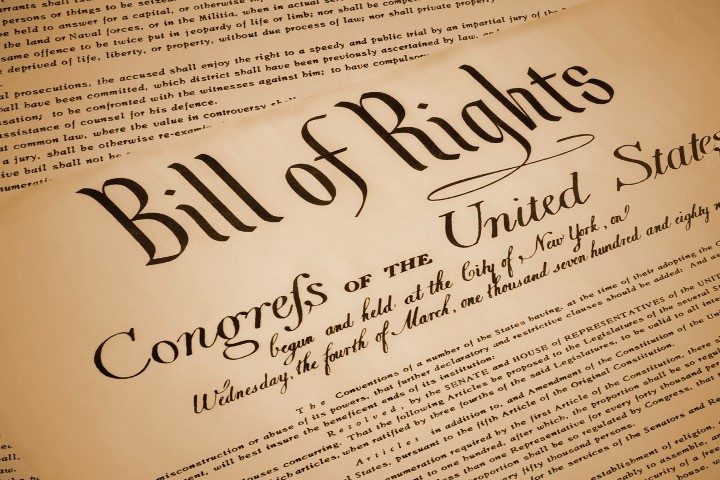
In a recent blog post, the Convention of States (COS) organization displayed its ignorance of the U.S. Constitution, as well as its desperation.
In a post entitled “WY Voters Targeted With Deception,” describing how John Birch Society members distributed flyers in opposition to Wyoming’s SJ11 calling for a constitutional convention, COS makes many false claims regarding the position of the JBS, as well as making public its own woeful ignorance of the purpose of the Bill of Rights and of any and all amendments to the Constitution.
Here’s the first bold-typed claim published in that COS blog post:
The authors of the fliers [Legislative Scorecards] say the amendment process in the Constitution is only to ‘correct errors’. Therefore they must believe the Bill of Rights, including the 2nd Amendment, is illegitimate! The Bill of Rights are 10 amendments that didn’t ‘correct errors’ but instead secured liberty.
And here are the mistakes.
First, the Bill of Rights most certainly was proposed and ratified in an effort to “correct errors” in the original text of the Constitution that came out of Philadelphia on September 17, 1787. To claim otherwise is to be ignorant to the extreme.
It was the lack of protection for fundamental liberty that prompted proponents of a bill of rights to demand such amendments be added to the Constitution as ratified. There is no shame in the fact that the document had errors and needed fixing. To suggest otherwise is to ignore so much of the historical record it is almost unbelievable.
While certainly not exhaustive, here are a few quotations from Founding Fathers identifying the Bill of Rights as a correction of an omission or shortcoming in the original text of the Constitution:
George Mason:
There is no declaration of rights, and the laws of the general government being paramount to the laws and constitutions of the several states, the declarations of rights in the separate states are no security.
I would rather cut off my right hand than put it to the Constitution as it now stands.
Patrick Henry:
My great objection to this government is, that it does not leave us the means of defending our rights or of waging war against tyrants.
Show me that age and country where the rights and liberties of the people were placed on the sole chance of their rulers being good men, without a consequent loss of liberty?
When about forming a government, if we mistake the principles, or commit any other error, the very circumstance promises that power will be abused. The greatest caution and circumspection are therefore necessary; nor does this proposed system, on its investigation here, deserve the least charity.
Thomas Jefferson (though he was in France during the Constitutional Convention, he corresponded on the subject):
A bill of rights is what the people are entitled to against every government on earth, general or particular, and what no just government should refuse, or rest on inference.
I do not like the omission of a Bill of Rights providing clearly and without the aid of sophisms for freedom of religion, freedom of the press, protection against standing armies, restriction against monopolies, the eternal and unremitting force of the habeas corpus laws, and trials by jury in all matters of fact triable by the laws of the land and not by the law of nations.
James Madison (often called the “Father of the Constitution” and a key drafter of the Bill of Rights):
It has been objected also against a bill of rights, that, by enumerating particular exceptions to the grant of power, it would disparage those rights which were not placed in that enumeration; and it might follow by implication, that those rights which were not singled out, were intended to be assigned into the hands of the General Government, and were consequently insecure. This is one of the most plausible arguments I have ever heard against the admission of a bill of rights into this system; but, I conceive, that it may be guarded against.
Richard Henry Lee:
It having been found from universal experience, that the most expressed declarations and reservations are necessary to protect the just rights and liberty of mankind from the silent powerful and ever active conspiracy of those who govern; and it appearing to be the sense of the good people of America, by the various bills or declarations of rights whereon the government of the greater number of states are founded: that such precautions are necessary to restrain and regulate the exercise of the great powers given to the rulers. In conformity with these principles, and from respect for the public sentiment on this subject, it is submitted, that the new Constitution proposed for the government of the United States be bottomed upon a declaration or bill of rights, clearly and precisely stating the principles upon which this social compact is founded.
If the Constitution’s lack of a bill of rights wasn’t an error that needed correcting, what do we say of a man — George Mason, a favorite of COS! — who claims he’d rather cut off his hand than sign that document?
Now for the next claim made by COS in the blog post:
The John Birch Society, who authored the opposition narrative to SJ11-Convention of States, labels supporters of SJ11 ‘anti-liberty’, despite the fact it is a Constitutional process giving the States authority to RESTORE liberty by reigning [sic] in the federal government.
Nope. Again, here is COS completely rewriting Article V to suit their purposes. Article V does not give the states authority to restore liberty by reining (not “reigning”) in the federal government.
Even if we assume that the intent of Article V was to protect such a power in the states, that completely ignores the first half of that article, the half giving power to Congress to amend the Constitution, a power which could be — as several Founders warned — used by Congress to keep the states from usurping too much authority!
Constitutional consistency and accuracy is obviously not within the wheelhouse of COS leadership.
Finally, here’s the last misleading claim made by COS in its post about its defeat in Wyoming:
Interestingly Robert Welch, the founder of the John Birch Society, lobbied for an Article V Convention of States (convention for proposing amendments) for Willis Stone’s Liberty Amendment, as did Larry McDonald who later became Chairman of JBS.
There is no evidence that Robert Welch or Larry McDonald supported an Article V convention of states for the purpose of proposing the so-called Liberty Amendment. (See here for information on that amendment.)
But even if these men had supported such a movement, it would have absolutely no bearing on the facts published by The John Birch Society since 1975, when then-Congressman McDonald introduced the Liberty Amendment in Congress.
Ask yourself this question: If Robert Welch or Larry McDonald were aware of the substantial threat to our Constitution posed by an Article V convention, do you think they would have supported it? Convention of States literature admits that The John Birch Society’s mission includes “defend[ing] our security and our liberties.” With that in mind, men of the caliber of Welch and McDonald would certainly oppose an Article V convention if they could be convinced — as they undoubtedly would be — that the process is fraught with danger and uncertainty that would undoubtedly be used by enemies of the Constitution to gain access to the assembly to eviscerate the Constitution and obliterate our security and our liberties.
While it is irrelevant whether Robert Welch or Larry McDonald ever supported an Article V convention, there is this explanation from The John Birch Society Bulletin from March 23, 2015:
One of the means by which this amendment [the Liberty Amendment] was promoted was to have states call for a constitutional convention. No JBS official dreamed that this would happen. Rather, agreeing with Mr. Stone, JBS leaders believed that this route to ratification would scare Congress into adopting the Liberty Amendment and then send it to the states for ratification. No one connected to the amendment wanted a Con-Con believing always that it posed a threat to the entire Constitution.
That places the COS claims under a very different light.
Perhaps it is more of a material concern that it would be a blight on the character of Robert Welch and Larry McDonald if, when presented with additional information, they would not have had the courage to change their opinions! I am reminded of the following observation made by Benjamin Franklin at the Constitutional Convention of 1787:
For having lived long, I have experienced many instances of being obliged, by better information or fuller consideration, to change opinions, even on important subjects, which I once thought right but found to be otherwise.
The question, patriots, is simple: Are you willing to risk the Constitution and the liberties it protects on the ignorant (or knowing) deception perpetrated by a couple of attorneys who are personally profiting from the process they are promoting?
Additionally, how many people would you trust to tinker with the Constitution? Do you think men like Bill Gates and George Soros would simply stand by idly while other men met to amend the Constitution? No.
Finally, we don’t need to deploy a nuclear bomb in our war against federal overreach. We have a much more effective and targeted weapon in our arsenal: state interposition. Rather than risking the future of our freedom to a group of unelected people attending a constitutional convention, we should exercise our right to rule ourselves by electing representatives to state government who are committed to being true to the oath they swore to support the Constitution.




